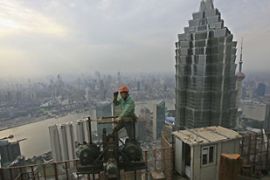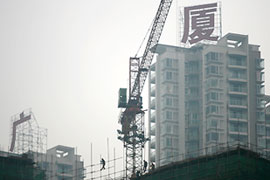China tightens building rules
Measures come amid spiralling energy costs and rising pollution.

Published On 22 Jan 2007
China is one of the biggest consumers of oil, gas and coal and the government is eager to see the country back away from a growing dependency on imported energy.
Recent studies have shown China to be the least energy-efficient of the world’s major economies, using several times as much fuel for each unit of output as the United States, Japan or European countries.
Cutting consumption
Under the new efficiency regulations all new buildings in China will be required to cut energy consumption for heating, lighting and air conditioning by 50 per cent, or by 65 per cent in China’s more prosperous cities, Qiu said.
 |
| Officials are worried that China’s booming real estate sector could overheat [GALLO/GETTY] |
Owners of existing apartments, office towers and other buildings will be required to improve efficiency with better insulation, low-energy lighting and other steps.
Qiu said homeowners were expected to spend an estimated $200 bn by 2020 on improvements to meet the new regulations.
This would create a “tremendous market” for energy-saving technology and renovation work, he said, adding the government was considering offering subsidies or tax breaks to help with the cost.
China is home to several of the world’s most polluted cities – mostly due to power plants burning vast amounts of dirty coal to power the country’s rapidly growing cities.
Rising costs
The new efficiency regulations came amid reports in state media that the government plans to enforce a long-standing tax on new property developments.
The move is part of government efforts to restrain rising housing costs and ease fears of a bubble in the property market that could leave banks saddled with billions of dollars in bad loans.
State news agency Xinhua said the tax which takes effect from February 1 would be equivalent to between 30 and 60 per cent of developers’ net gain on a real estate deal.
It gave no details as to which types of property would be affected.
Xinhua said the tax had been approved as far back as 1993, but had not been enforced due to a recession in real estate development.
Source: News Agencies